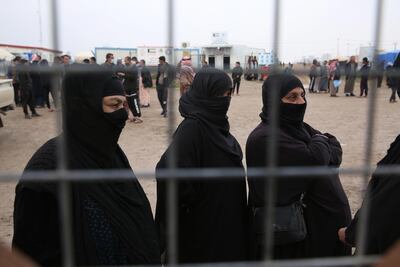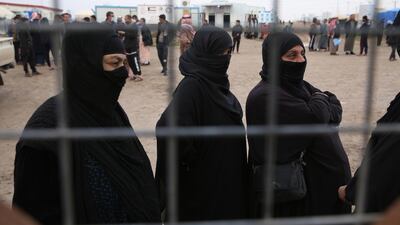Over the weekend, Germany and Finland repatriated from Syria 18 children and five women, all suspected relatives of ISIS militants. They were brought home on humanitarian grounds, with the women described as being in "very poor health".
The decision is overdue. Most European states, some of the richest in the world, have done little to relieve the burden European ISIS detainees placed on stretched authorities in Syria and Iraq. The detention centres in which they are housed are dangerous, over-crowded, difficult to control and largely populated with women and children. Groups like the Al Khansaa brigade, a self-appointed ISIS female "police team", enforce their law, routinely dishing out beatings and intimidation.
Moral arguments appear largely to have failed in convincing European states to live up to their responsibility over these citizens. Fears over repatriating extremists are understandable; the number of returnees would be difficult for intelligence agencies to monitor over the long term. There are also fears that prosecutors would not be able to muster enough evidence to secure sentences. De-radicalistion will be hard, as European states still struggle to come up with effective strategies. And the resistance of many law-abiding European citizens will be significant. But any desire to give in to these fears is ultimately flawed. The moral and strategic arguments for returning ISIS relatives are stronger.

In the long run, Europe is not safer with the status quo. There are worries that detainees could overcome fragile security in the camps and smuggle themselves to ISIS cells in the Middle East or Europe. Formal repatriation allows for detainees to be documented properly. Keeping ISIS's most committed supporters – many people in these camps stayed until the very last days of the caliphate – grouped in one place, may help members plan attacks. It is dangerous for Europe to have tragically large numbers of its children in an environment so conducive to indoctrination. It also unconscionable to condemn them to a life of imposed extremism – a choice they, unlike their parents, did not make consciously.
Workarounds undertaken by countries like the UK, in cases such as that of Shamima Begum – a British ISIS wife stripped of her citizenship on the basis she might be eligible for a Bangladeshi passport by descent – place an unjust burden on some of the poorest states in the world, damaging the credibility of European values. Moreover, why should Bangladesh, a country Begum has never lived in, be responsible for her and justice for her victims, rather than Britain?
These shoddy attempts to displace responsibility also set a legal precedent of British dual nationals being cast out of the reach of the UK criminal justice system. Begum’s punishment could not be given to someone with British ancestry, implying that British law applies more completely to those with single nationality. Legal gymnastics of this kind also add to false narratives exploited by terrorists that Brits born to Muslim parents are second-class citizens.
Reconciling these issues with confidence in the integrity of Europe’s laws and values is of significant importance to the safety of Europeans. Furthermore, it demonstrates an understanding that the moral and strategic factors are intertwined. The most effective long-term strategy against the disillusionment and nihilism that leads to terrorism is not through watering down ethical standards and the law, but by asserting them consistently – even in the most difficult cases. By bringing these 18 children and their mothers home from a life of terror, Germany and Finland uphold their ideals.


